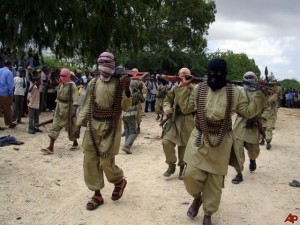The defections of two fighters, an American and a U.S. resident, from Somalia’s Islamic extremist rebels highlight tensions within al-Shabab over whether it should remain affiliated to al-Qaida or switch allegiance to the Islamic State group, according to an al-Shabab commander.
Foreign fighters are being alienated and feel trapped in Somalia over suspicions that they are plotting to switch allegiance to the Islamic State group fighting in Syria and Iraq, Abu Mohammed, a military commander with Al-Shabab told The Associated Press Tuesday. The “ambitions” by some foreign fighters in al-Shabab to join the Islamic State group had led to them to be isolated within the Somali group and even face death at the hands of their erstwhile comrades-in-arms.
An American who had been fighting with al-Shabab left the rebels and was arrested by Somalia’s security forces on Monday. Abdimalik Jones, who said he is from San Diego, was arrested in the southern port of Barawe, said African Union spokesman Col. Paul Njuguna.
Jones claimed he fled al-Shabab because of rifts within the group, said an official with Somali security forces who insisted on anonymity because he is not authorized to speak to the press. Jones is missing the index finger of his right hand, said the official.
Separately an American resident, a Minnesota man named Mohamed Abdullahi Hassan, who joined al-Shabab in Somalia more than seven years ago, surrendered to Somalia’s federal government on Nov. 6, the U.S. State Department said in an email to The Associated Press. It’s not immediately clear why his arrest wasn’t announced earlier. Hassan was a lawful permanent resident of the U.S. but not an American citizen.
Hassan had been fighting with al-Shabab but recently went online to urge others to carry out violence on behalf of IS. State Department spokeswoman Pooja Jhunjhunwala said Hassan is in the custody of the Somali National Intelligence and Security Agency in Mogadishu. She said the U.S. is discussing the case with the Somali Federal Government, but noted that Washington does not have an extradition agreement with Somalia.
The two defections show tensions within al-Shabab, according to Mohammed.
“Some mujahedeen fighters are now preferring to fall into the enemy’s hands instead of meeting death in the hands of brothers,” said Mohammed, adding that the friction over IS “is messing everything up here.”
Al-Shabab’s leadership declared that fighters acting in contravention with the mainstream stand to be aligned with al-Qaida would represent “Bid’ah,” or misguidance, which would lead to them being killed.
Foreign fighters with al-Shabab would have to give up their desire to join IS to escape death, said Mohammed.
“They have no choice,” he said by phone from southern Somalia.
The defections by the two foreign fighters would not have much impact on al-Shabab militarily, but it may make it more difficult for al-Shabab to recruit more foreign fighters, said a senior Somali intelligence official.
“At this point, the group is gambling on its drive to attract foreign volunteers — it gives the impression that foreigners are unwelcome,” said the official, who insisted on anonymity because he is not authorized to speak to the press.
He said the defections of the two Americans appear to be separate.
“They have no time to coordinate for their defections,” he said. “Everyone is on his own way to escape an imminent death.”
———
Associated Press writer Amy Forliti in Minneapolis contributed to this story.
